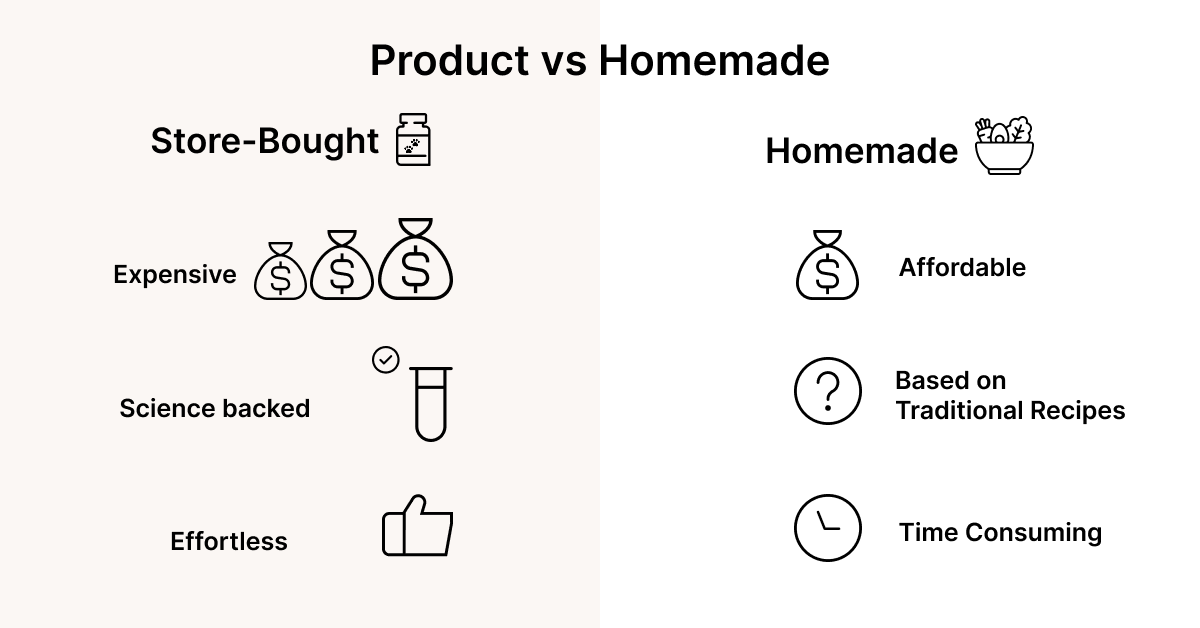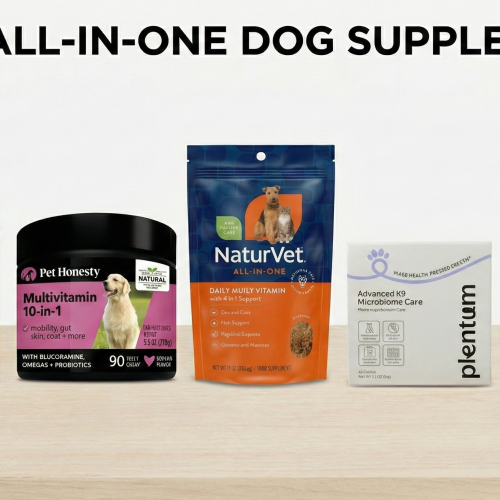As a dog owner, you want what’s best for your furry friend’s health. You’ve likely heard about the benefits of probiotics for improving digestion, boosting immunity, and even helping with issues like diarrhea and allergies. This leads to a crucial question: should you buy a specially formulated canine probiotic, or can you give your dog homemade probiotic-rich foods like yogurt or kefir?
This guide breaks down the pros and cons of both approaches to help you make an informed decision.
Store-Bought Probiotics: The Convenient & Targeted Choice
Commercial probiotics are specifically designed for dogs and are the most common choice for owners looking for a reliable solution. These products come in various forms, including powders, chews, and capsules.
Pros:
- Guaranteed Potency & Specific Strains: This is the biggest advantage. A reputable store-bought product will list the exact strains of bacteria (like Enterococcus faecium or Lactobacillus acidophilus) and guarantee the number of Colony Forming Units (CFUs). This is critical if you’re targeting a specific health issue. For example, the best probiotic for dogs with diarrhea will contain strains clinically studied for that purpose.
- Convenience and Ease of Use: There’s no prep work involved. You simply add the recommended dose to your dog’s food. This makes it easy to ensure your dog gets a consistent amount every day.
- Formulated for Survival: The top-rated dog probiotics are designed to survive the harsh acidic environment of a dog’s stomach, ensuring the beneficial bacteria reach the intestines alive and ready to work.
- Safety and Quality Control: Trusted brands undergo rigorous testing to ensure their products are free from contaminants and meet the potency claims on the label.
Cons:
- Cost: High-quality, high-CFU dog probiotics can be an ongoing expense. The price often reflects the research and quality control that goes into the product.
- Fillers and Additives: Some lower-quality or affordable dog probiotics may contain unnecessary fillers, artificial flavors, or preservatives that you might prefer to avoid. Always read the label carefully.
Best For: Owners who need to address a specific health concern (diarrhea, allergies, post-antibiotic care), value convenience, and want the assurance of a scientifically formulated, dose-specific product.
Homemade Probiotics: The Natural & Economical Option
Homemade probiotics typically involve giving your dog small amounts of fermented foods like plain, unsweetened yogurt, kefir, or even fermented vegetables like sauerkraut.
Pros:
- Cost-Effective: Making yogurt or kefir at home is significantly cheaper than buying a monthly supply of commercial supplements.
- Natural & Whole-Food Based: You have complete control over the ingredients. You know your dog is getting a whole food without any fillers or artificial additives.
- Diverse Bacteria: Fermented foods can contain a wide and diverse range of beneficial bacteria, which can be great for general gut health maintenance.
Cons:
- Unknown Potency and Strains: You have no way of knowing which specific strains of bacteria are in your homemade batch or in what amount. The CFU count can vary wildly from one batch to the next, making it unreliable for therapeutic use.
- Dairy & Palatability Issues: Many dogs are lactose intolerant, so dairy-based options like yogurt and kefir can sometimes cause digestive upset—the very thing you’re trying to prevent.
- Harmful Ingredients: You must be extremely careful. For example, store-bought yogurt is often sweetened with xylitol, which is highly toxic to dogs. You must only use plain, unsweetened varieties.
- Not Canine-Specific: The bacteria in human foods are not necessarily the most beneficial strains for a dog’s unique digestive system.
Best For: Healthy dogs without specific issues, where the goal is a general wellness boost from a whole-food source. It’s a good option for owners who are on a budget and are diligent about using pet-safe ingredients.
Comparison Chart: Dog Probiotics [Brand vs. Homemade]
| Feature | Store-Bought Probiotics | Homemade Probiotics (e.g., Yogurt/Kefir) |
|---|---|---|
| Primary Goal | Targeted therapeutic support | General wellness |
| Strain Specificity | Yes, specific strains listed | No, unknown mix of strains |
| Potency (CFU) | Guaranteed and consistent | Unknown and varies per batch |
| Convenience | High (scoop or chew) | Low (requires preparation) |
| Cost | Higher initial and ongoing cost | Very low cost |
| Safety | Regulated and tested | Risk of using unsafe ingredients (xylitol) |
| Best For… | Dogs with diarrhea, allergies, yeast issues, or on antibiotics. | Healthy dogs needing a general gut health boost. |
Conclusion: Which Probiotic Is Best for My Dog?
So, are dog probiotics worth it? Absolutely. But the choice between store-bought and homemade depends on your goal.
The best canine probiotics for health condition management or antibiotic treatment support or reliable dosage delivery come from top-rated dog probiotic powders or chews from reputable brands. The ability to evaluate dog probiotics and select one with established strains represents an essential advantage.
A spoonful of plain unsweetened homemade yogurt or kefir serves as an excellent natural and budget-friendly supplement for maintaining healthy gut function in dogs who are already in good health.
The most secure and efficient way for new probiotic users to begin is by selecting a well-reviewed commercial product. Your veterinarian should help you decide the most suitable approach for your dog’s specific requirements.







